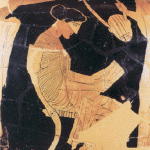Last week, I went to town on the excessive rationalism and the lack of “poetic enthusiasm” (William Ellery Channing) in the Unitarian Universalist church. But as I sat in the service this past Sunday, I felt that I had been unfairly harsh last week.
For the past year, we have had a young interim minister who really has been great. One of his first sermons coincided with one of the stations of the Wheel of the Year and he actually walked around the chapel calling the quarters. I looked around at my fellow congregants wondering if they were going to run him out on a rail right then and there. But the humanists seem to have gone along with it with good-natured humor. This past Sunday, he did the same, calling the quarters in Neo-Wiccan fashion. This is not a practice that I share, but I do appreciate the effort to include Pagan ritual — any ritual for that matter — in the UU service.
But what I really found striking was the ritual dedication of a baby which was recently born to a couple in the congregation. My pastor was kind enough to share the text of the ritual with me:
Pastor:
We are blessed this morning
with the opportunity
to dedicate ourselves
to the raising and nurture of our children.
Assistant:
To paraphrase Kahlil Gibran,
“Our children are not our own.
They are the sons and daughters of life’s longing for itself.
They come through us but not from us,
and although they are with us,
they do not belong to us…
We are the bows
from which our children as living arrows are sent forth.
The Archer sees the mark upon the path of the infinite,
and bends us with might
that the arrows may go swift and far.
May our bending in the Archer’s hand be for gladness.”
Assistant:
R. and J., would you please come forward,
with E. and her godparents and grandparents?
Pastor:
And would the children please come forward,
and sit down here in front.
You all have a role in this ritual, too.
{children come forward}
Pastor:
This is not a baptism,
nor a ritual to usher E. into a certain belief system.
We do not wish to impose our beliefs upon her.
Assistant:
We are not “saving” E. with our actions today,
we are rather welcoming her on the path to being human,
and committing to help guide her as she finds her own way.
UU dedication services often use a rose in the ceremony.
It’s an appropriate symbol to bless a child with –
beauty and inspiration combined with the prickly part of life.
That’s the true beauty of a rose, and of life.
It’s lovely, and sometimes it hurts.
Pastor:
Do you know how hard it is to find a rose with thorns in this country?
They strip the thorns off as soon as they arrive in flower shops.
We chose a rose with thorns specially.
We do not want to protect you from life,
we want to give you the tools
to cope with life’s thorns.
Pastor:
R. and J. have chosen the name, “E.”
for their infant daughter.
They explain that
“E.” means “light”
and it was the first name out of the baby book
that they could both agree on.
“E.” is in honor of the memory of R.’s late big sister.
Pastor:
J. and R.,
as parents of E.,
do you take upon yourselves
the privilege, responsibility, ache and joy
of caring for them in body, mind and spirit?
If so, say “we do.”
We do.
Assistant:
S. L., A. R. and R. T.
are E.’s godparents:
Do you promise to live your lives
as a model
for her to follow as she grows?
If so, say “we do.”
We do.
Pastor:
Do you promise to bring to her
your personal caring
and insight about the wondrous gifts of life and love,
into which we may all learn and grow?
If so, say “we do.”
We do.
Pastor:
Now we turn to E.’s grandparents,
R. D., R. and W. R., and C. T.
Do you promise to respect the choices made by R. and J.,
in the raising and nurture of their daughter, E.?
If so, say “we do.”
We do.
Assistant:
Do you promise to love them and protect them,
and to tell them your family stories,
so they feel connected to their heritage?
If so, say “we do.”
We do.
Pastor:
E., unique in the universe, precious and powerful:
I touch your brow to dedicate you to a life of careful and good thinking.
I touch your eyes to dedicate you to a life of clear vision, unclouded by prejudice or fear.
I touch your mouth to dedicate you to a life of powerful and honest speech.
I touch your heart to dedicate you to a live of generosity and love.
I wet your hand with this water,
as both blessing from, and obligation to, your family,
both closely related and those throughout the interconnected web of life.
I rub this earth into your hand to dedicate you to a life of hard work,
and to remind your parents
to teach you that it is good to get your hands dirty
doing the work of the world.
May the work of your hands be blessed,
all the days of your life.
Pastor:
Will the children of the congregation please stand?
It is your turn to make a promise.
Have any of you met E. yet?
Do you remember when you were this little?
You know, you will always be bigger than her,
so it is important to treat her right.
Do you promise to welcome E.,
to watch out for her,
and to help her when she is sad or hurt?
If so, say “we do”
We do.
Assistant:
Do you promise to treat E. as you want to be treated?
We do
Assistant:
Will the congregation please rise, in body or spirit?
Do you promise to nurture E.
and share the resources for her religious education?
If so, please respond, “we do.”
We do.
Pastor:
Do you promise to live your lives in such a way
that the lives of all children are enhanced?
We do.
Assistant:
So may we be.
I was deeply touched by this ritual and how it bound the entire congregation together with the life of this child. I was especially impressed by the use of water and earth in the ritual. I could not have written a better ritual for the dedication of my own children. Sure, it was still a little didactic. It was an example of what I have called the “exoteric” and “symbolic” levels of ritual. It did not reach the “spiritual” or “mystical” levels. But it was a baby dedication, not the Eucharist. It was a great example of what it was intended to be.
Still I wonder if we would ever see what I have called “spiritual” or “mystical” ritual in the UU, ritual intended to either facilitate individuation or a controlled dis-integration of the ego. The historical inertia of about 200 years of a “too partial culture of the mind” (William Ellery Channing) stands in the way. But perhaps the “language of reverence” discussion going on in the UU will eventually translate into rituals of reverence, which will give rise to experiences of reverence, and then we will have something to talk about with our new-found “language”.















